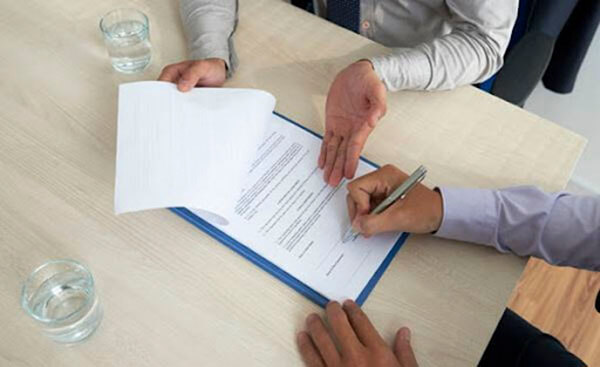Currently, the demand of 100% foreign-invested enterprises leasing and purchasing houses in Vietnam is growing strongly. So what is a 100% foreign-invested enterprise leasing and purchasing houses in Vietnam? What are the issues surrounding the leasing and purchasing of houses by 100% foreign-invested enterprises in Vietnam today? Let's find out about the current legal regulations related to this issue below with NPLaw.

Currently, the demand of 100% foreign-invested enterprises leasing and purchasing houses in Vietnam is growing rapidly. This has been a significant trend in the Vietnamese real estate market in recent years.
In fact, 100% foreign-invested enterprises leasing and purchasing houses in Vietnam are one of the types of foreign companies that operate in Vietnam with 100% of the capital investment coming from foreign investors. Accordingly, these companies will lease and purchase houses in Vietnam for business purposes, offices, factories, or for employee housing. Leasing and purchasing houses helps companies save costs compared to direct ownership and provides flexibility in changing business locations if necessary.
The popular areas that foreign enterprises often choose to lease and purchase houses in Vietnam include major cities such as Hanoi and Ho Chi Minh City, as well as industrial zones and new urban areas.
However, leasing and purchasing houses for 100% foreign-invested enterprises also requires careful understanding of legal regulations and specific conditions. Companies need to consult with legal experts and real estate consultants to ensure compliance with regulations and protect their interests during the lease and purchase process.
A 100% foreign-invested enterprise leasing and purchasing houses in Vietnam is a type of company that operates in Vietnam with 100% of the capital investment of this company coming from foreign investors. This company leases and purchases houses in Vietnam for business purposes, offices, factories, or employee housing. The method of leasing and purchasing houses will help this company save costs compared to direct ownership and provide flexibility in changing business locations if necessary.
According to Article 75 of Decree 99/2015/ND-CP (as amended by Clause 22, Article 1 of Decree 30/2021/ND-CP) stipulating the areas where foreign organizations and individuals are allowed to own houses, as follows:
- Foreign organizations and individuals are only allowed to own residential properties (including apartments and detached houses) in commercial housing investment projects, except in areas that are required to be protected for national defense and security purposes under Vietnamese law.
- The Ministry of National Defense and the Ministry of Public Security are responsible for identifying specific areas that need to be protected for national defense and security purposes in each locality. Then they will issue a written notification to the provincial People's Committees, which will be used as the basis for directing the Department of Construction to identify specific lists of commercial housing investment projects in the localities that allow foreign organizations and individuals to own residential properties.
Therefore, enterprises with 100% foreign capital are only allowed to own houses (including apartments and individual houses) in commercial housing development projects, except for areas that are required to ensure national defense and security under the regulations of Vietnamese law.
 3. In what cases are 100% foreign-owned companies not allowed to lease or buy houses in Vietnam?
3. In what cases are 100% foreign-owned companies not allowed to lease or buy houses in Vietnam?It is also stipulated according to Article 75 of Decree 99/2015/ND-CP (as amended by Clause 22, Article 1 of Decree 30/2021/ND-CP), which clearly states the areas where foreign organizations and individuals are allowed to own houses, as follows:
- Foreign organizations and individuals are only allowed to own residential properties (including apartments and detached houses) in commercial housing investment projects, except in areas that are required to be protected for national defense and security purposes under Vietnamese law.
- The Ministry of National Defense and the Ministry of Public Security are responsible for identifying specific areas that need to be protected for national defense and security purposes in each locality. Then they will issue a written notification to the provincial People's Committees, which will be used as the basis for directing the Department of Construction to identify specific lists of commercial housing investment projects in the localities that allow foreign organizations and individuals to own residential properties.
Therefore, foreign-invested enterprises with 100% foreign capital investment operating in Vietnam are not allowed to buy houses from Vietnamese households or individuals; they are not allowed to buy houses from Vietnamese organizations that are not project investors, not allowed to receive the donations or inheritances of houses outside of housing investment projects.
According to Article 160 of the Law on Housing 2014, the conditions for 100% foreign-invested enterprises to lease or purchase houses in Vietnam are as follows:
- For 100% foreign-invested enterprises that invest in housing construction projects in Vietnam, they must have the Investment Certificates and have houses built in the projects in accordance with the provisions of the Law on Housing 2014 and relevant Laws.
- For 100% foreign-invested enterprises that are operating in Vietnam, they must have the Investment Certificates or documents related to the permission to operate in Vietnam (hereinafter referred to as the Investment Certificate) issued by the competent state authorities of Vietnam.
According to Clause 2, Article 159 of the Law on Housing 2014, there are regulations on the forms of house ownership in Vietnam of 100% foreign-invested enterprises, as follows:
- Investment in housing construction projects in Vietnam in accordance with the provisions of this Law and relevant laws;
- Purchasing, leasing, receiving the donations, or inheriting commercial housing, including apartments and detached houses in housing development projects, except for areas that are required to ensure national defense and security as prescribed by the Government.

According to Article 162 of the Law on Housing 2014, the obligations of the owners of houses who are 100% foreign-invested enterprises when owning houses in Vietnam are as follows:
-Foreign organizations and individuals who are specified in Point a, Clause 1, Article 159 of this Law have the same obligations as owners of houses according to Article 11 of this Law.
-Foreign organizations and individuals who are specified in Points b and c, Clause 1, Article 159 of this Law have the same obligations as Vietnamese citizens who own residential properties, but they must comply with the following regulations:
-If the owners are foreign individuals, they are allowed to lease the residential properties (houses) for using purposes that are not prohibited by the Law. However, before leasing the residential properties, the owners have to submit written notifications to the housing management agencies of the district where the residential properties are located as defined by the provisions of the Minister of the Ministry of Construction, and have to pay taxes on these rental activities in accordance with the Law. (...)
-In the case of foreign individuals who marry Vietnamese citizens or Vietnamese citizens residing abroad, they have the same obligations as Vietnamese citizens who own residential properties.
-If the owners are foreign organizations, they may only use the residential properties to provide housing for employees of those organizations, and may not use the residential properties for leasing as offices or other purposes.
- The payment of the purchase or lease of the residential properties must be made through financial institutions operating in Vietnam.
According to Point d, Clause 2, Article 161 of the Law on Housing 2014, which stipulates the ownership period of houses for foreign organizations, as follows:
- Foreign organizations are allowed to own residential properties in accordance with the agreements in the purchase, lease, donation, or inheritance contracts, but the maximum period of ownership shall not exceed the period specified in the Investment Certificate issued to the organizations, including any extensions. The period of ownership shall be calculated from the date the organizations are granted the Certificates and shall be clearly stated in the Certificates.
- Therefore, according to the above regulations, 100% foreign-invested enterprises that lease houses in Vietnam have a maximum ownership period equal to the period specified in the companies’ Investment Certificates, including any additional extensions; the ownership period of the houses is calculated from the date the organizations are granted the Certificates and is clearly stated in the Certificates.
In the case of 100% foreign-invested enterprises that have expired the lease of houses, the extension right will depend on the terms and conditions agreed upon in the lease agreements. Typically, the lease agreements will clearly specify the rights and responsibilities of both parties during the lease period, including contract extension.
If the contracts don’t mention the right to extend, the companies can negotiate with the landlords to extend the lease period. However, the right to extend may also be limited or denied if the landlords don’t agree or if there are other special conditions.
Above are all the detailed information that our NPLaw provides to support our customers on the issue of 100% foreign-invested enterprises leasing and purchasing houses in Vietnam. If you have any questions related to the above issue or other legal issues, please contact NPLaw immediately to receive direct advice and guidance from our team.
CÔNG TY LUẬT TNHH NGỌC PHÚ
Customer service: 19009343
Hotline: 0913 41 99 96
Email: legal@nplaw.vn